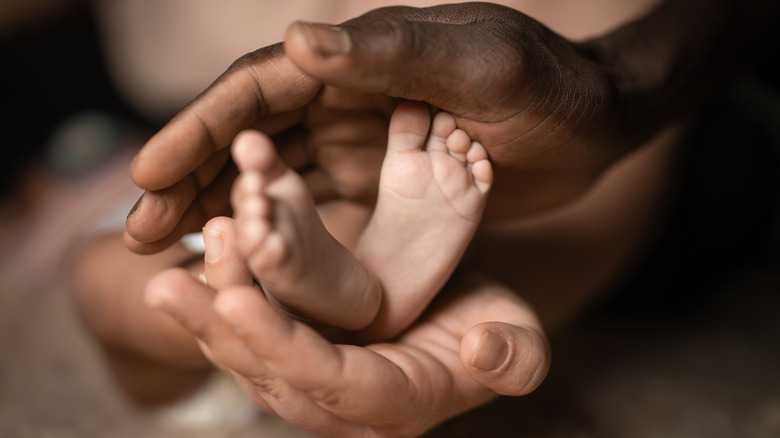What Does It Mean When You Have A Rainbow Baby?
The beauty of rainbows carries uplifting messages of happiness. In many cultures, rainbows can signify hope and better moments ahead, reports BBC Culture. Usually seen after a rain or thunderstorm, the rainbows we see displayed across the sky are naturally created when the rays of the sun reflect on resting water and transform existing white light into a spectrum of colors ranging from violet to red. Rainbows culturally embody the significance of hope after troubling times with the beauty of a colorful sky after shadows cast by dark rain clouds disband. The hope and joy rainbows represent are often extended to the tender moments in our lives, from fearful times of separation to circumstances of loss, and how we are able to enjoy positive moments to come.
Aptly named, the term "rainbow baby" refers to having a healthy child after having gone through the loss of another, per Healthline. After gaining traction in pop culture and online discourse, the title of a rainbow baby is given to a healthy baby following a parent's loss of another child through miscarriage, stillbirth, or infant death. The term is also used to acknowledge the journey of having a healthy baby after having gone through the dark storm of the loss of a child. Having a rainbow baby is an experience that is unique for everyone and often comes with complex layers of emotions as the dark storm clouds of grief give way to the healing brought on by the colors of a rainbow.
You may experience complex emotions
Having a rainbow baby may feel like an emotional rollercoaster. No matter the stage of pregnancy or infanthood in which child loss occurs, the grief placed on parents can be overwhelming. Approximately a quarter of pregnancies result in a loss by miscarriage, death at birth or in infanthood, and early pregnancy loss through improper implantation, like ectopic pregnancy or an embryo that fails to develop in a situation called blighted ovum (per WebMD). After losing a child, many parents are faced with emotions, including fear, anxiety, and grappling with insecurity and perceptions of failure. The birth or adoption of a healthy child following the loss of a baby can introduce feelings of hope, healing, and happiness to the existing mix of feelings brought on by loss, ultimately creating an emotional journey that can be confusing and multiplexed.
The American Pregnancy Association says that the complexity of emotions faced by parents when welcoming a rainbow baby is unique to each person, though feelings of guilt, excitement, and relief are common. This combination of feelings may seem confusing, which is an emotional journey through which parents of rainbow babies must venture. If child loss occurs during pregnancy or at birth, a woman's body will need time to heal from the physical trauma. However, healing one's emotional or mental health following child loss can take longer than physical recovery. Finding ways to heal and thus enjoy the colors of the rainbow is a key step to take.
Create a support network
When you have a rainbow baby, make space to process your experience in full by validating all of your emotions. Some elements of grief may stay with you for life, but you can nonetheless find ways to enjoy the happiness of having a rainbow baby. During your journey, it's important to create a support network of family members, friends, neighbors, and healthcare professionals, says Healthline. Joining a support group or finding a mental health practitioner who specializes in loss are beneficial additions to a support network. Since mothers who birth rainbow babies are at higher risk of developing postpartum depression, consult your doctor about how to monitor the health of your developing baby and manage postpartum maternal health. Additionally, there are available tests that can provide information about the development of a baby in-utero, as well as at-home techniques, like counting and logging how often your baby kicks, especially during the third trimester. Being open about your feelings is key in reinforcing your support system.
Having a solid support system can help you process the journey of having a rainbow baby and honor the fact that your experience is unique. "Support groups with individuals in similar circumstances can also be helpful. However, bear in mind that every story is different and sometimes listening to others' stories can trigger even more intense feelings of anxiety," Anate Brauer, MD, tells Forbes. Be patient knowing that your journey will be complex, but a rainbow is on the horizon.



